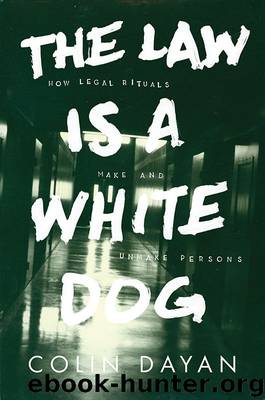The Law Is a White Dog by Colin Dayan

Author:Colin Dayan [Dayan, Colin]
Language: eng
Format: epub
Tags: Filosofia
Publisher: Princeton University Press
Published: 2011-02-06T23:00:00+00:00
WHAT’S IN A WORD?
Oliver Wendell Holmes warned, “We are not studying etymology, but law.”19 But the legal history of the word “wanton” is crucial to the case law concerning cruel and unusual punishment. Its use targets the power and privilege enjoyed by agents administering torturous treatment, whether prison correctional officers or interrogators of alleged “enemy combatants.” In the spectacle of lust and shame recorded in the Abu Ghraib photos; the shackles, dogs, “restraint chairs,” and permanent solitary confinement at Guantánamo Bay; and the treatment in super-max confinement in the United States, the drama of degradation turns on the relation between those who get to be wanton and others who count only as something of nonvalue: conceptually no longer persons who suffer cruelty or torture.20
How could these treatments be legal? The answer lies in the extraordinary latitude that prison guards and officials enjoy, thanks to enabling Supreme Court decisions. Beginning in the 1980s with a series of cases challenging inadequacies in medical care, use of force, and conditions of confinement, the Court turned to a novel translation of malice aforethought for murderers into the maliciously wanton standard for prison officials. The full force of mental volition is transferred to the person of the prison official. The requirement that aggrieved prisoners show deliberate indifference by their keepers when claiming cruel and unusual punishment permits untoward rationalizations. This reasoning measures cruelty not by the pain and suffering inflicted but by the intent of the person who inflicts them. In the vain search for intent, the official who commits the act is vindicated while the object of harm is ignored.
In their discussion of ancient criminal law in 1898, Pollock and Maitland explained: “A mean must be found between these two extremes—absolute liability for all harm done, and liability for harm that is both done and intended.” This attempt “to detect and appreciate the psychical element in guilt and innocence,” they acknowledge, is doomed to failure.21 We will see that the Eighth Amendment cases of the Rehnquist court and the torture memos of 2002 and 2003 written by lawyers for the Bush administration, however, depend on the concept of intention. Moreover, the switch to a focus on intent drastically transformed Eighth Amendment cases, and the attribution of both moral responsibility and legal liability constitutes the background against which the disfigurement of prisoners and detainees must be understood.
“Wanton” means you cannot be shamed; you cannot be humiliated. It applies only to the dominating, not to the subordinated. The latter are completely powerless before this word that curiously mixes caprice and wickedness: a profligate and maleficent magic. What does this term’s applicability—to what kind of persons can it be applied—say about thought and feeling, cognition and affect? Before parsing and elaborating the language of wantonness in U.S. prison cases that have turned on the legal meaning of the Eighth Amendment prohibition on “cruel and unusual punishments,” I examine whether qualitative distinctions, not simply dictionary definitions of “wanton,” can illuminate the standards invoked by its use.
But, first, two
Download
This site does not store any files on its server. We only index and link to content provided by other sites. Please contact the content providers to delete copyright contents if any and email us, we'll remove relevant links or contents immediately.
| Comparative | Conflict of Laws |
| Customary | Gender & the Law |
| Judicial System | Jurisprudence |
| Natural Law | Non-US Legal Systems |
| Science & Technology |
American Kingpin by Nick Bilton(3886)
Future Crimes by Marc Goodman(3598)
The Meaning of the Library by unknow(2571)
Inside the Middle East by Avi Melamed(2356)
Why Nations Fail: The Origins of Power, Prosperity, and Poverty by Daron Acemoglu & James Robinson(2297)
On Tyranny by Timothy Snyder(2231)
Living Silence in Burma by Christina Fink(2071)
Putin's Labyrinth(2022)
The Mastermind by Evan Ratliff(1937)
The Smartest Kids in the World by Amanda Ripley(1856)
Think Like a Rocket Scientist by Ozan Varol(1819)
Law: A Very Short Introduction by Raymond Wacks(1747)
It's Our Turn to Eat by Michela Wrong(1731)
The Rule of Law by Bingham Tom(1698)
Philosophy of law a very short introduction by Raymond Wacks(1670)
Leadership by Doris Kearns Goodwin(1638)
A Dirty War by Anna Politkovskaya(1630)
Information and Communications Security by Jianying Zhou & Xiapu Luo & Qingni Shen & Zhen Xu(1621)
Civil Procedure (Aspen Casebooks) by Stephen C. Yeazell(1556)
